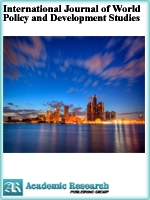International Journal of World Policy and Development Studies
Online ISSN: 2415-2331
Print ISSN: 2415-5241
Print ISSN: 2415-5241
Quarterly Published (4 Issues Per Year)

Archives
Volume 4 Number 10 December 2018
Federalism and the Challenges of Nation Building in Nigeria
Authors: Chijioke Basil Onuoha ; John E. Bassey ; Henry Ufomba
Pages: 112-118
DOI: doi.org/10.32861/ijwpds.410.112.118
Abstract
Nation-building is about building the tangible and intangible threads that hold a political entity together and gives it a sense of purpose. It was the belief of Nigerian nationalists that federalism will foster nation building in Nigeria, but fifty-eight years down the line as an independent nation, Nigeria is still grappling with challenges of nation building. Acknowledging this as a threat to the nation continued existence this paper discusses the implication of the continued practice of skewed federalism “Nigeria Model” and it effect on the country quest to become a strong and united nation. Adopting the descriptive method of enquiry as well as Integration paradigm as analytical guide, the paper argues that though federalism is the most suitable principle for ensuring nation building in a heterogeneous country like Nigeria, the “Nigeria Model” of federalism where so much fiscal resources and responsibilities is being concentrated in the center to the detriment of the states breeds confrontation between the central government and component units, thus hamper nation building. For empirical analysis, this study makes a survey of 1500 government officials and citizens out of which 1346 questionnaires were returned. The data obtained was analyzed using Pearson Correlation which showed a significant relationship between nation building and three key variables (federal structure, citizen perception of the political structure, and interaction of the tiers of government). The paper recommends, among other things, a review of the 1999 constitution to reduce the power and responsibilities of the federal government to common services like Foreign Affairs, Currency, Immigration and Defence and granting of more responsibilities to states as well as a reintroduction of the Derivation Principle which allow states generate it revenue from the resources available in it domain and give a percentage to the central government. This will bring out ingenuity inherent in the various states and lead to healthy competition in terms of development. This proposed new federal arrangement will not only give confidence to but enhance nation building in the country.
The Socio-Economic Impact of Mining Companies to Their Host Communities in Northern Part of Surigao Del Sur Province
Authors: Odinah Cuartero-Enteria
Pages: 103-111
DOI: doi.org/10.32861/ijwpds.410.103.111
Abstract
The operation of mining companies in the province has generated various impacts on their host and surrounding communities. No wonder, mining companies consistently provide inputs and support to sustain their services for the welfare of the community. This paper reports the findings of a study undertaken to assess the socio-economic impact of mining companies to their host communities in the northern part of Surigao Del Sur Province. This paper also presents the perceptions of respondents based on their socio-economic background and identified possible ways on how to deal with its impacts. Purposive sampling was employed in the selection of the participants. Data were collected through the researcher-made questionnaire, which solicits the socio-economic impacts and how these impacts are perceived by the host community. Findings revealed that mining companies have brought positive impacts on the socio-economic status of the people. The resources were wisely shared to the community through offering various activities and programs. However, even if the companies have been helpful to their community, yet, they have not done much to please the other aspects. The increasing records on low-paid employment position stressed public and health services, occurring prevalent diseases and over population are few of the evident that require much attention from the companies. Hence, conscious effort with the assistance of the government and other concern agencies should be practiced to mitigate the increasing undesirable impacts.



